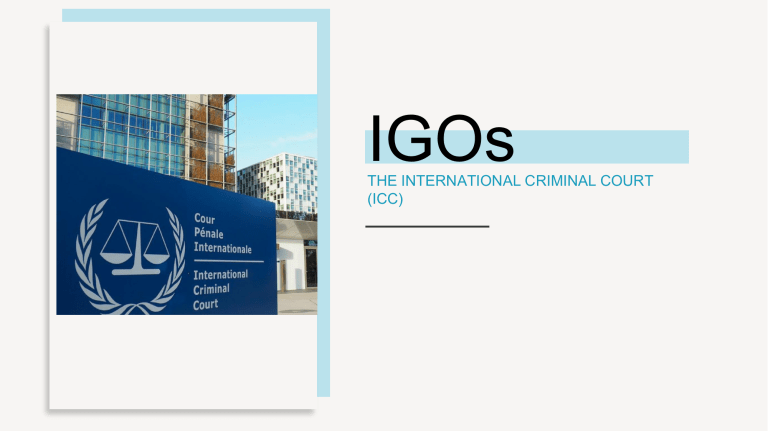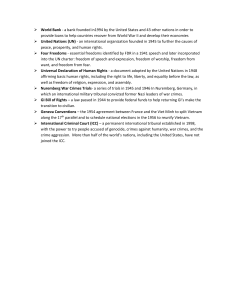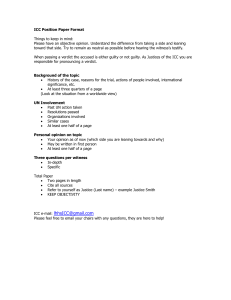
IGOs THE INTERNATIONAL CRIMINAL COURT (ICC) Key Questions ● What are the aims of the ICC? ● What is the role of the ICC? ● How much power does the ICC have? ● Does the ICC achieve its aims? ● To what extent does the ICC challenge state sovereignty? How can we decide if an actor is powerful? Power = How (or whether) ‘Global Actor A’ can get ‘Global Actor B’ to do what ‘Global Actor A’ wants • Power = “the ability of one global actor to influence the actions of another global actor. Power can be exercised in a range of types.” • Power = examining the sources of a global actor’s power (capabilities, capacities, mechanisms) • Power = the extent to which a global actor can achieve their aims; where there is no marked difference between an actor’s intentions and their results • Power = the extent to which a global actor can challenge sovereignty of states. PREVIOUS ICC Questions 2018 Question 1. Describe one way in which the ICC encouraged cooperative action among state actors. 3 marks. Other examples adapted from past papers referring to other IGOs: 2017 Question 1a) Identify one role of the ICC. 1 mark. 2017 Question 1b) Explain one limitation of the power of this intergovernmental organization. 3 marks. 2016 Question 1a) State one aim of the ICC. 1 mark. 2016 Question 1b) Explain the power of the ICC. 4 marks. 2015 Question 2) Explain how the ICC supports global governance. 4 marks. 2014 Question 3c) Explain one criticism of the performance of this institution of global governance in recent years. 3 marks. 2013 Question 1b) State one example of an action taken by the ICC. 1 mark. 2013 Question 2a) Define ‘global governance’ as it relates to the study of global politics. 2 marks. 2012 Question 1a) State one objective of the ICC 1 mark. 2012 Question 2) Describe one of the roles of the ICC. 3 marks. Vocabulary Definition Global Governance Refers to institutions, rules, norms and legal arrangements that seek to facilitate cooperation, and manage relations, between states. Governance is carried out by both governmental organisations such as the United Nations and non-governmental organisations. Ratify To make an agreement official. Note, that it means that the law has been granted approval by the state internally and the state notifies other actors that it agrees to be bound by the laws. It is the practical application of the law, as opposed to a state signing its approval. Treaty A formally concluded and ratified agreement between states. Genocide The deliberate killing of a large number of people from a particular nation or ethnic group with the aim of destroying that nation or group. War Crimes A war crime is a serious breach of international law committed against civilians or “enemy combatants” during an international or domestic armed conflict. A war crime occurs when superfluous injury or unnecessary suffering is inflicted upon an enemy. Crimes Against Humanity Crimes against humanity refer to specific crimes committed in the context of a large-scale attack targeting civilians, regardless of their nationality. These crimes include murder, torture, sexual violence, enslavement, persecution, enforced disappearance What is the International Criminal Court? ● Watch: https://www.youtube.com/watch?v=rLqIeWnD3VM ○ ○ What is it? What are the limitations to ICC power? ● The International Criminal Court (ICC) was established in a treaty in 1998 called the Rome Statute, which came into effect in 2002 when 60 states ratified it. ● It tries individuals accused of genocide, war crimes and crimes against humanity. ● It was formed by a treaty, not by the UN. It cooperates with the UN but they are separate organisations. AIMS and ROLES OF THE ICC Aims of the ICC i) To ensure the worst perpetrators are held accountable for their crimes. ii) To serve as a court of last resort that can investigate, prosecute and punish the perpetrators of genocide, crimes against humanity and war crimes. iii) To assist national judiciaries in investigating and prosecuting the worst perpetrators, allowing states to be the first to investigate and prosecute. iv) Deter future perpetrators by setting an example they will be brought to justice. Role of the ICC i) Enforce the Rome Statutes: The Court can submit requests for the arrest of individuals to states, send investigators to collect evidence and hold suspects in detention at The Hague only for alleged crimes committed after the 1st July, 2002. ii) To conduct trials: Suspects are innocent until proven guilty beyond reasonable doubt by the Court. iii) To prosecute the perpetrators of serious crimes: If found guilty, perpetrators serve their sentence in a state designated by the court that is willing to take them. SOURCE OF ICC POWER ● When states ratify the Rome Statute, they agree to: ○ ○ ○ ○ Provide required information to the Court Provide technical and financial assistance to states wishing to ratify the Statute. The court has a staff of nearly 1,000 and an annual budget of more than $180m but has struggled to secure convictions in a series of high-profile cases. There are 123 countries party to the Rome Statute. Power of the ICC: Is IT able to achieve its aims? Does it Influence other ACTORS? ● The Court serves as a moral authority and sets standards of international justice. ● Provides a voice to victims of crimes against humanity and the ability to request reparations (compensation) for their trauma. ● The act of presiding over cases means that it is educating the world about human rights and raising awareness of war crimes. POWER OF THE ICC: IS It able to Achieve its aims? Does it Influence other Actors? ● It is a court of last resort. It does not replace the judicial systems within states and it will only participate if a state is unwilling or unable to prosecute an accused individual. ● The principle of complementarity means that state systems retain primacy and have the primary responsibility for prosecuting perpetrators accused of serious crimes. ● Only two (France and the UK) out of the five permanent members of the UNSC have signed and ratified the Rome Statute. ○ ○ ○ Russia never ratified the Rome Statute and withdrew its approval (signatory status) in November 2016. The US has not ratified the Statute either, citing its incompatibility with the US Constitution as a reason. China is not a member either. ● It relies on the cooperation of states to enable it to make arrests, transfer persons to the ICC detention centre in The Hague (Netherlands), freeze suspects assets and enforce sentences and lacks an independent enforcement mechanism (without a police force- states hold this monopoly). CASE STUDY 1: Prosecution of Dominic Ongwen ● Known as the "White Ant“ ● Abducted when he was estimated to be between nine and 14 years old, while ● ● ● ● ● ● ● walking to school in Uganda. He tried to escape but then rose rapidly through the ranks of the Lord’s Resistance Army, becoming a Brigadier. Claiming to fight for a biblical state, the LRA has killed more than 100,000 people and kidnapped more than 60,000 children during the three-decade long conflict which spread to several of Uganda's neighbours. He has now been found guilty of 61 of the 70 counts of war crimes and crimes against humanity committed between July 2002 and December 2005. They relate to attacks on four camps, guarded by the security forces, set up for those forced to flee their homes because of rebel raids. He was also convicted of charges relating to sexual slavery and conscripting and using children under the age of 15 in hostilities, forced marriage, torture, and rape. The crime of conscripting children under the age of 15 into the Sinia brigade and using them to participate actively in hostilities. The Chamber found that these crimes were committed in the context of the armed rebellion of the Lord's Resistance Army (LRA)against the government of Uganda. The TRIAL ● In 2004, the Government of Uganda referred the situation on its territory since 1 July 2002 to the ICC. Since then, the ICC Office of the Prosecutor has investigated alleged war crimes and crimes against humanity committed during armed conflict in Northern Uganda. ● More than 4,000 victims have participated in the trial - represented by two legal teams - most of them former camp residents - and the trial has detailed the lives lost, destruction, abductions and psychological damage to these communities in northern Uganda. https://www.bbc.com/news/world-africa-30709581 https://www.icc-cpi.int/itemsDocuments/ongwen-verdict/qandqongwen-verdict-eng.pdf The VERDICT ● In February, 2021, Ongwen was sentenced to 25 years in prison for war crimes and crimes against humanity committed as a commander in the Lord’s Resistance Army (LRA). ● The presiding judge, Bertram Schmitt, said the panel of judges had considered sentencing Dominic Ongwen to life imprisonment, the court’s harshest punishment, but had sided against it due to the defendant’s own personal suffering. ● The now 41-year-old was “a perpetrator who wilfully brought tremendous suffering upon his victims, however, also a perpetrator who himself has previously endured extreme suffering at the hands of the group of which he later became a prominent member and leader” according to the Court and he was not forced to commit crimes in fear of death. Did the ICC Achieve its AIMS? Aims of the ICC i) To ensure the worst perpetrators are held accountable for their crimes. ii) To serve as a court of last resort that can investigate, prosecute and punish the perpetrators of genocide, crimes against humanity and war crimes. iii) To assist national judiciaries in investigating and prosecuting the worst perpetrators, allowing states to be the first to investigate and prosecute. iv) Deter future perpetrators by setting an example they will be brought to justice. Your Turn ● Read Document 6 ● Complete reading and questions on pp. 28-29 of workbook pdf ● 3.1 Notes Table

